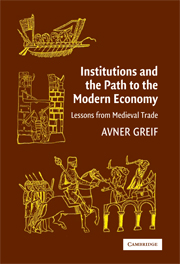Book contents
- Frontmatter
- Contents
- Abbreviations
- Preface
- I Preliminaries
- II Institutions as Systems in Equilibria
- III Institutional Dynamics as a Historical Process
- IV The Empirical Method of Comparative and Historical Institutional Analysis
- V Concluding Comments
- Appendixes
- A A Primer in Game Theory
- B Is Homo Sociologicus Strategic?
- C The Role of Theory: Reputation-Based Private-Order Institutions
- References
- Index
- POLITICAL ECONOMY OF INSTITUTIONS AND DECISIONS
B - Is Homo Sociologicus Strategic?
Published online by Cambridge University Press: 05 September 2012
- Frontmatter
- Contents
- Abbreviations
- Preface
- I Preliminaries
- II Institutions as Systems in Equilibria
- III Institutional Dynamics as a Historical Process
- IV The Empirical Method of Comparative and Historical Institutional Analysis
- V Concluding Comments
- Appendixes
- A A Primer in Game Theory
- B Is Homo Sociologicus Strategic?
- C The Role of Theory: Reputation-Based Private-Order Institutions
- References
- Index
- POLITICAL ECONOMY OF INSTITUTIONS AND DECISIONS
Summary
The analysis in this book accepts the notion that people tend to respect the socially expected and normative sanctions (Chapter 5). It also rests on a particular notion of rationality, maintaining that when institutions generate behavior, socially articulated and disseminated rules regarding the situation span the domain that people understand and within which they can act rationally. Are these two premises consistent with each other? Is it appropriate to consider individuals as strategic while recognizing that social and normative considerations influence behavior? Or should we model people as homo sociologicus, as passive rule followers? Specifically, is it appropriate to model individuals who have such social and normative inclinations as rational decision makers when they are guided by socially articulated and disseminated rules? Do they have stable preferences regarding outcomes? Are they motivated by the consequences of their actions? In other words, do they act strategically? This appendix presents evidence to support the claim that, although people have social and normative propensities, it is nevertheless appropriate and necessary to consider them as rational in the abovesense.
Experimental game theory is a promising analytical framework to address these questions, particularly because participants share common knowledge of the rules of the game and many experiments were explicitly designed to reveal individuals' social and normative inclinations. These experiments provide three ways to address the foregoing questions: considering whether nonrational explanations better fit the data, testing whether the observed behavior is consistent with some well-behaved preference ordering, and using experimental results to determine whether people are motivated by consequences and behave strategically.
- Type
- Chapter
- Information
- Institutions and the Path to the Modern EconomyLessons from Medieval Trade, pp. 421 - 427Publisher: Cambridge University PressPrint publication year: 2006



